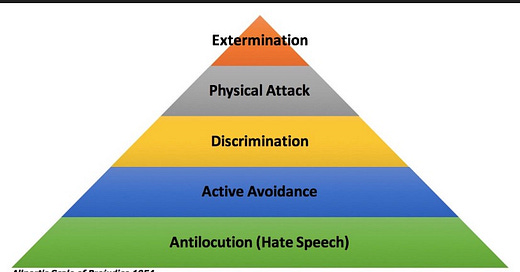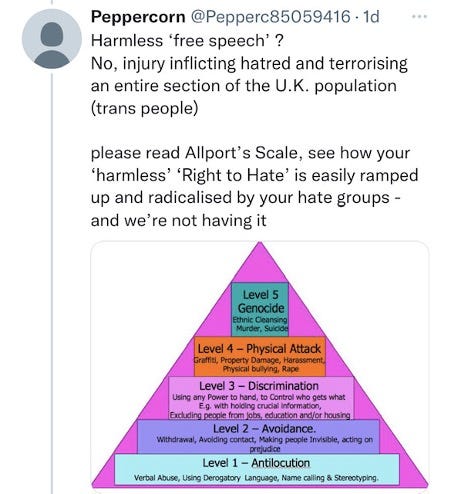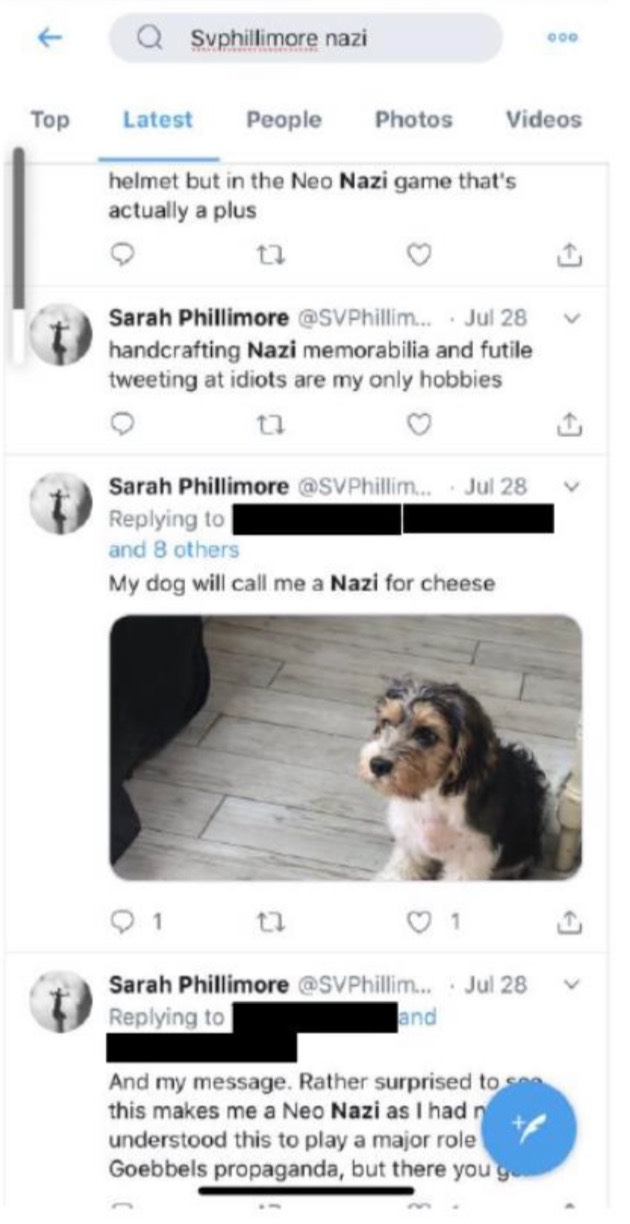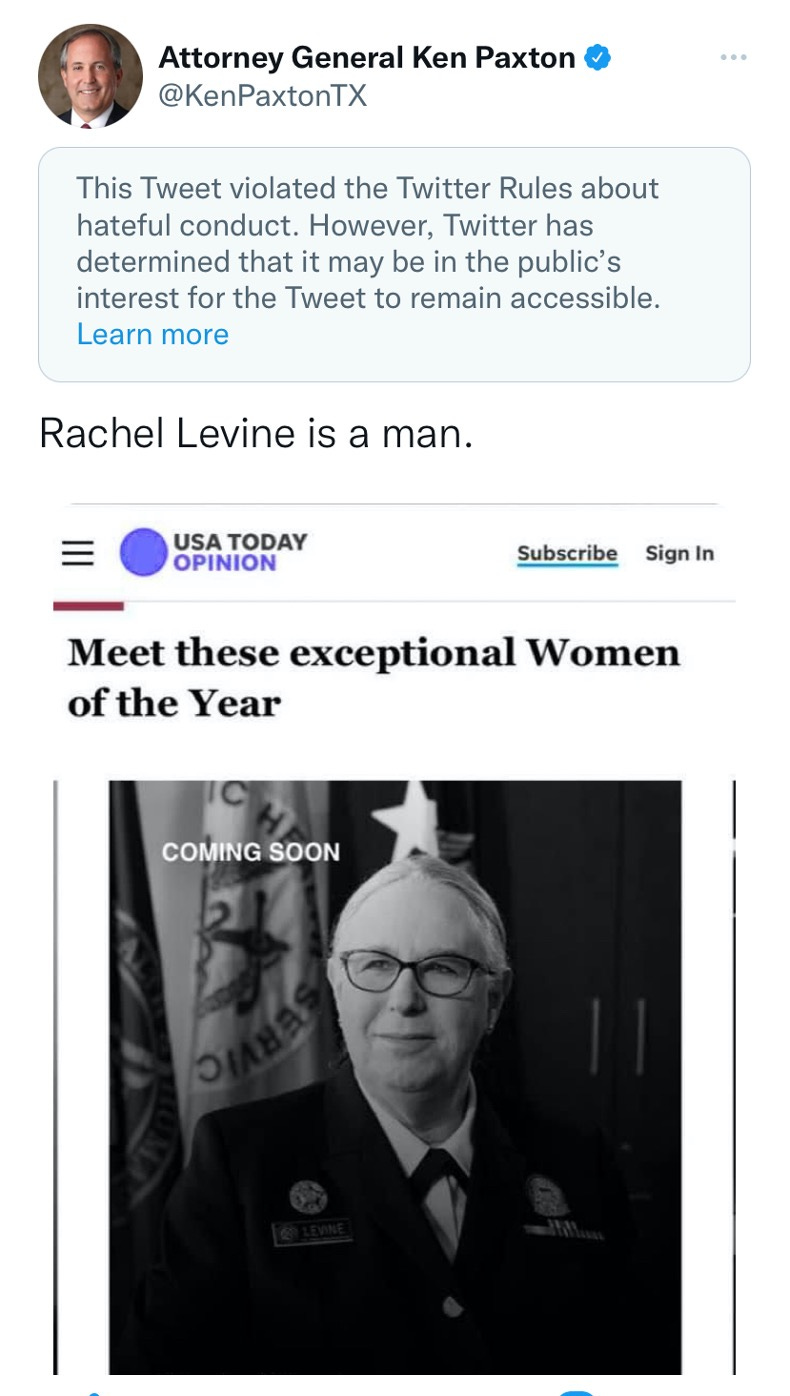The Absurdity of Hate Crime
Finding someone absurd is close to finding them contemptible. What is the consequence of this for our relationship with the State?
The absurdity of hate crime
There are many cases in domestic and international law that set out the importance of free speech and I rely on all of them as uncontroversial affirmations of the necessity of free speech to any healthy democracy. I also accept that free speech cannot be without limits. It is the question of where those lines are drawn and who draws them that is my discussion today. What happens when one dominant ideology imposes a definition of ‘hate’ that can be seen by the majority to be absurd?
Being absurd is clearly not a good thing if you want to be taken seriously. Being found absurd is a close neighbour to being found contemptible – there is research showing how contempt is a very strong indicator of an intimate relationship that is in deep trouble. John Gottman, the American psychologist found it the single greatest predictor of divorce.
The relationship we have with the State is of course different to the relationship we have with another human. But it is not a great leap to assert that any kind of relationship cannot flourish when one half finds the other absurd.
A recent scroll through Twitter indicates that many who favour the continued expansion of hate crimes appear to embrace their absurdity, possibly getting carried away with rhetorical device in place of evidence or coherent argument.
I will start with a brief look at Gordon Allport’s Scale which was created in 1954 as a measure of the manifestation of prejudice in society.
‘Antilocution’ means ‘speaking against’ and encompasses more than simply obviously hateful or derogatory speech but jokes as well. This is because both examples can be examples of prejudice, resting on negative stereotypes and negative images.
This has been very influential on the Hate Crimes Guidance and used to explain the necessity of dealing sternly with ‘naughty tweets’. While we can all reasonably criticise the wide net and lose definitions that have been used to justify qualifying certain speech as ‘hate’, or which lumps clear expressions of hate with a joke or clumsy remark, we can at least see the logic in this progression.
Now see how the Allport Scale has been re-calibrated by those who wish to elevate the expression of gender identity above all other forms of expression.
The sheer absurdity of this re-framing can be seen in Level 4 where ‘graffiti’ is just one step away from ‘Genocide’ and indeed ‘graffiti’ appears on a list alongside rape. No reasonable person could fail to find this absurd.
This re-framing comes from a 2018 blog by someone called Patti Digh whose qualifications appear to be that she experienced the death of her step father. She asserts that we need to look again at Allport’s work on the ‘Stages of Prejudice’ after Trump used dehumanising language about immigrants, calling them ‘animals’. She said
In Allport’s research, he recognized that the first stage of prejudice is jokes and slurs–using language to dehumanize, for example, as Trump consistently does.
The response to jokes and slurs is often that they are harmless, and that we are overreacting, but in Allport’s model, they are the foundation for the next stages of prejudice, which include avoidance, discrimination, violence, and genocide.
Language matters. Jokes and slurs are not harmless. They are, instead, a seed.
Of course, the beating heart of the problem here is that our tolerance levels differ widely. One man’s poor joke is another’s deadly insult. But I suggest it is absurd to suggest that a joke which misses the mark for some is a seed which will grow into genocide if left unchecked.I can give a very personal example of this. I was for 2 years and one month unlawfully recorded and retained on a police data base by Wiltshire police as ‘a barrister posting hate’. If you want to see the true depths of my hate you can view the tweets complained about on the Fair Cop website.
There you will find 12 pages of tweets deemed representative of my hate-mongering and worthy of recording for a minimum of six years, to inform police operational decisions about my hatred towards transgender and Jewish people. My favourite will always remain a photo of my dog as a puppy with the caption ‘my dog will call me a Nazi for cheese’. The ‘victim’ of my hate had conducted a search of my tweets using the word Nazi and my dog ended up recorded as an example of hatred towards transgender people, for reasons which have never been explained to me. I suggest because it defies explanation.
I found out about this in July 2020, after the victim of my hate helpfully boasted on social media what he/she/xir had done and I made a request to see all the personal data Wiltshire had recorded. Over the next six months, two further recordings were made and disclosed; even more absurd than the first. My favourite in the second batch was a tweet where I posted a short video clip of a police officer dancing at a Pride March and captioned it ‘hitherto unseen footage of my specialist hate crimes officer’.
Both these examples of ‘antilocution’ sufficiently serious to be recorded on a police data base for six years are patently absurd. I was not expressing ‘prejudice’ towards anyone, other than possibly Nazis and unlawful police behaviour, which I assume the majority of people would think a positive thing. There is simply no possible link between these sarcastic tweets and a suggestion that I wish to murder trans people.
I had to go through a year long process of complaints to Professional Standards before I could join Wiltshire to my judicial review application against the College of Policing, against the Hate Crimes Guidance which I asserted was irrational, unreasonable and in breach of ECHR articles 8 and 10 as well as data protection law. The wait included a report from the Hate Crime Lead himself Paul Giannasi https://le.ac.uk/hate-studies/advisory-board/paul-giannasi-obe who reassured Wiltshire that they had acted perfectly properly but perhaps it might be wise to put a marker next to my name for future complaints and record that I objected. Wiltshire declined.
We had to wait until December 2021 for Harry Miller to be proved right; the Hate Crimes guidance in its current form, allowing ‘perception based’ recording of ‘hate’ without any investigation or attempt at applying an objective standard, was unlawful. It permitted a breach of Article 10 ECHR. It must be revised.
On 17 January 2022 the House of Lords debated the Police, Crime, Sentencing and Courts Bill. Baroness Williams introduced the Government’s amendment, which would confer power on the Secretary of State to issue a code of practice about the processing by the police of personal data relating to a hate incident, other than for the purposes of a criminal investigation. The code should examine whether and how such data should be recorded, when the “data subject” should be told they have been recorded, and how long that data should be kept. No time scales for the arrival of this Code were given.
Nor does the College of Police appear to be aware of it. They wrote to my solicitors proposing a further adjournment to my judicial review until the end of May to allow them to review and ‘potentially revise’ the guidance. But there is no ‘potentially’ about it. The Court of Appeal have clearly ruled that this guidance is unlawful.
Happily Wiltshire confirmed on 31st January that they would no longer contest my application and they would delete the recording made on December 2019. The next day they promised an ‘expedited audit’ and would apply the principles of the Court of Appeal judgment in Miller to any other recordings. Given their level of absurdity, I expected therefore all recordings relating to me to be deleted and this was confirmed.
This is on one analysis, excellent news. On another analysis it is a terrifying indictment of a system that was wedded to something so patently absurd and unlawful that it simply closed its ears and mind to anyone pointing out all the many ways the system failed.
I will have my good character restored. But there are over 120k ‘hate incidents non crimes’ now recorded. From mine and Harry’s experience, the majority of them will be as petty and ridiculous as mine. You will not be told if you are recorded. There will be no investigation. The recording will simply sit there and wait for its potential future disclosure to an employer.
All hate incidents non crimes must now either be audited or deleted. Every force should follow Wiltshire’s lead. What the College of Policing have authorised is unlawful, now declared to be so and urgent revision of this Guidance must be a priority.
I suspect some people who have invested a great deal of time and their professional reputations in upholding the ‘hate crime’ industry are going to struggle to come to terms with this. It must be difficult I accept to be on the ‘right side of history’ one day and responsible for the breach of fundamental human rights the next
Some green shoots
The recent Maya Forstater Employment Tribunal I suggest exposed clearly the barren argument of ‘its offensive’ without stopping to think – what exactly does this mean?
Interestingly, on 18th March 2022 the Texan Attorney General Ken Paxton, with 177K followers tweeted ‘Rachel Levine is a man’. Twitter acknowledged this breached their terms of service as ‘hateful conduct’ but hid the term behind a notice that saying despite this breach, it was in the public interest to allow the tweet to remain.
This is a very interesting decision from a social media platform notorious for the opacity and unfairness of its unexplained rules governing conduct – where a woman talking about biology risks instant expulsion but a man can threaten to kill or rape her and is left untouched.
And don’t we now get to the beating heart of all this? Hate – like love – has myriad definitions. Hate – like love – can be used to justify truly terrible behaviour. Hate – like love – is a universal human emotion. Hate – like love – can be hugely damaging. But so too is attempting to quash the expression of universal human emotions.
The dangers of allowing one dominant group to impose its own definition of ‘hate’ are so clear and obvious, that I find it frustrating we still have to gather to have these conversations. I note with exasperation that the organisation ‘Hope Not Hate’ issued a report in March 2022 claiming a rise of ‘hate’ due to infiltration by Far Right groups. This dismissed Harry Miller in a few lines, apparently not considering that his Court of Appeal victory merited any attention. This lack of attention is surprising when you remember that Hope Not Hate provided evidence in support of the College of Policing at Miller’s first hearing. Why should any organisation with such a selective view of reality be allowed to dictate what ‘hate’ means to the rest of us? The court concluded there wasn’t anything remotely ‘hateful’ about what Miller tweeted.
I suggest the solution is relatively simple. Speech that incites violence, targets individuals for abuse or harassment or tells damaging lies about them should be unlawful, it should be silenced and those who persist should be punished. Otherwise we don’t have a society that is worth living in.
But speech that merely offends must be protected with persistent rigour. Otherwise, we don’t have a society that is worth living in. This point was made compellingly in the Forstater Tribunal – making ‘offence’ the criterion for a policy breach is not compatible with a democratic society.
And we cannot permit any arm of the State to be perceived as absurd. This is corrosive and dangerous to a healthy democracy and the rule of law. If we feel contempt for our spouse, we can divorce, which is a personal tragedy. But if we feel contempt for our State then this risks anarchy – which is a tragedy for us all.







I am particularly interested in public organisations eg. like libraries holding online events and then using 'time-lapse' to mitigate "hateful" comments and later deleting all negative comments /feedback or even complaints so that feedback analysis is skewed and simply does not reflect public opinion. Even if some of comments are indeed hateful, threatening or abusive if they all are "disappeared" by staff how does this demonstrate transparency and accountability?
Thank you Sarah for this brilliant essay which puts so coherently my instinctive but muddled thoughts. More than anarchy, I fear it's the road to fascism.